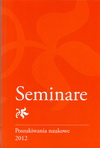Problem prawdy u Wilhelma z Owernii
The problem of truth according to William of Auvergne
Author(s): Tomasz PawlikowskiSubject(s): Language and Literature Studies
Published by: Towarzystwo Naukowe Franciszka Salezego (TNFS)
Keywords: Medieval Philosophy; Truth; Future Contingents; Metaphysics; Logic
Summary/Abstract: William of Auvergne (1180–1249) was one of the first wave professors of University in Paris to engage with Greek, Islamic and Jewish philosophical writings that had become available in Latin translation. He was the author of a vast work that he calls the Magisterium divinale (Teaching on God). De universo (On the Universe), written in the 1230s, is the most philosophical treatise of the Magisterium. One short part (I, 3, 25-26) of this treatise includes a very important philosophical topic – the problem of truth. Based on a doctrine of Avicenna, William formulated one of the forms of truth's classical definition. In his view, this definition express the essence of logical truth, which is constituted in any relation between human intellect and things, if intellect is adequate to his object. So the logical truth is a basis and property of true judgments and statements about all real things, and even about what really does not exist (things in the future, in the past, non-beings, negations), and – generally – about all the man can think or about everything possible to thinking. William rejects the doctrine of St. Augustine, who taught that every truth has its source in the First Truth identified with God the Creator of all things and intellects contingent. William argues that only actually existing things are real existing as caused by God. So only actually existing things can be substrates of truth and so subjects of true judgments and statements. The Creator doesn't cause things as existing in the past, in the future, but as existing in the present. What is more, He doesn't cause non-beings and negations. In consequence, William recognizes logical truth as the only justification for true adjudication of all what exists and doesn't exist. In Steven P. Marrone's opinion William's theory of truth is a new idea in the early thirteenth century. He believes that William's theory, however incomplete, explains how much the problem of truth is depended on logic rather than metaphysics, so that it could be separated radically from questions of being and viewed independently of the issue concerning the relation of the mind and creatures to God. In fact, although William continued to speak in traditional terms, he divorced with the point of view of ontology and natural theology, finding solutions in theories of logic and language. However, taken in this article studies seem to show that William's theory of truth is embedded in a metaphysical context. Furthermore, medieval logic is the science of the action of the intellect, which is a faculty of human being. This is not logic in twentieth-century's sense. Thus, it does not seem to William resigned from metaphysics to logic. His theory of logical truth is imperfect because of metaphysical errors. The main error is that the logical truth, which realizes in the relation of intellect to things and so is one of truths that exist in contingent beings, William considered as final and the sole basis of every true jud
Journal: Seminare. Poszukiwania naukowe
- Issue Year: 31/2012
- Issue No: 1
- Page Range: 87-102
- Page Count: 16
- Language: Polish

